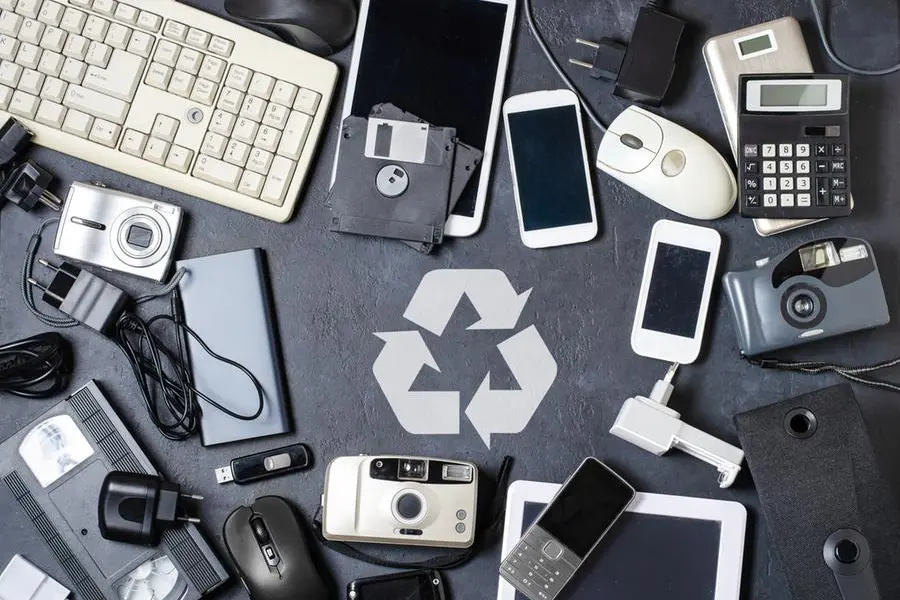PHOTO
An influx of short-lived electronic devices, including mobile phones, computing devices, chargers, and household appliances, which break down easily due to poor manufacturing standards, is leaving an ill-equipped Africa with electronic waste crisis, warn sector players.
According to director general and chief executive of the Communications Authority of Kenya (CA) David Mugonyi, these are now undermining efforts to build a sustainable and circular economy."A surge in the importation of counterfeit and low-quality electronic products and end-user devices which have a shorter lifespan and generate a large amount of e-waste, have aggravated the situation, and endanger the entire value chain," said Mr Mugonyi, at the seventh edition of the East African Communication Organization (EACO) Regional Conference on Sustainable E-waste Management held in Nairobi.
In Kenya alone, the Anti-Counterfeit Authority (ACA) estimates annual losses of Ksh85 billion–Ksh100 billion ($653 million -$769 million) to counterfeit trade, with electronics among the hardest-hit segments.
Mr Mugonyi blamed the flooding of the markets with inferior products that generate unsustainable volumes of waste on the lack of strict import controls and enforcement mechanisms.
Read: E-waste rise in EA worries tech providers, linked to public health issuesAccording to executive director EACO Dr Ally Simba, the problem is regional in scale. In 2019 alone, Africa generated 2.9 million tonnes of e-waste, a number that has since increased.
Yet only a fraction of countries in the region have the infrastructure to collect, repair, or recycle electronics. In Nigeria, Ghana, and the Democratic Republic of Congo—some of the largest e-waste hotspots in West and Central Africa—informal recycling remains the norm, often involving dangerous practices such as open burning or acid baths."With millions of these reaching end-of-life each year across the region, the challenge of safe disposal is mounting," he said.
Globally, 62 million metric tonnes of e-waste were generated in 2022, according to a joint statement by the International Telecommunication Union (ITU) and United Nations Institute for Training and Research (UNITAR).
That number is projected to reach 82 million tonnes by 2030. Alarmingly, only 22.3 percent of e-waste produced globally is formally collected and recycled—and in Africa, that figure drops below one percent.
Stanley Kamanguya, chief executive of the ICT Authority, noted that Africa is fast approaching an annual e-waste generation of five million tonnes. "This is a serious obstacle to our goal of digital transformation," he said. "It demands a fundamental shift—not only in how we manage existing e-waste, but also in how we design, use, and dispose of future digital devices."He said to address this, Kenya has established a national e-waste management facility as part of its National Digital Master Plan. In the current financial year, the ICT Authority aims to collect 100,000 end-of-life devices from government agencies and offices in the current financial year."We’ve already recovered 30,000 devices, and half have been assessed for potential reuse—whether for schools, NGOs, or repair training centers," Kamanguya noted. "This is a small but essential step toward creating a circular economy."Director of Environmental Enforcement at the National Environment Management Authority (Nema), Dr Ayub Macharia, said that only a handful of facilities in Kenya are currently capable of extracting valuable materials from e-waste, while the rest is often left as toxic residual waste.
In response, Kenya enacted the Sustainable Waste Management Act in 2022, followed by new Extended Producer Responsibility (EPR) regulations in 2024.
Under the regulations, all producers must declare the volume of electronics they bring into the market and present detailed plans for reuse, recycling, or environmentally sound disposal.
A compliance deadline of May 4 has been set for all producers to register with PROs and submit waste management reports aligned with government regulations.
Other countries in the region are following suit. Rwanda recently launched a national e-waste dismantling facility capable of handling up to 10,000 tons annually.
Repair and recycling hubsIn Ethiopia, the government has partnered with UNDP to establish repair and recycling hubs in urban centers.
Uganda has piloted an e-waste take-back programme with telecom providers, encouraging users to return old phones in exchange for service discounts.
At the seventh regional e-waste conference held in Nairobi last week, experts from across East Africa emphasized the importance of harmonizing e-waste policies to enable cross-border cooperation to combat illegal dumping and facilitate cross-border recycling.
Dr Simba outlined a regional roadmap that includes extended producer responsibility, circular economy promotion, and zero-impact waste management strategies.
Read: High-end cellphone makers cut out accessories to curb e-waste menace"We must treat e-waste not as trash, but as a resource," said Dr Simba. "There’s gold, copper, rare earths—all recoverable with the right technology and investment. With proper incentives, we can build an industry that protects the environment and creates jobs."The conference also highlighted the urgency of formalizing the informal sector, which currently handles over 90percent of Africa’s e-waste but lacks safety training and equipment.
Governments were urged to offer technical support, legal frameworks, and micro-financing to help these workers transition to safe and regulated recycling.
The United Nations warns that e-waste is growing five times faster than documented recycling efforts. If left unchecked, Africa risks becoming a global dumping ground for digital waste, threatening both its environment and its ambitions for digital transformation."This is not just an environmental crisis—it’s a public health, economic, and social justice issue," said Mr Mugonyi. "We must act collectively, urgently, and boldly."
© Copyright 2022 Nation Media Group. All Rights Reserved. Provided by SyndiGate Media Inc. (Syndigate.info).





















